Social and Ethical Marketing Issues
VerifiedAdded on 2023/04/20
|11
|3511
|388
AI Summary
This essay analyzes the relevance of social and ethical marketing issues within the framework of the contemporary business world. It discusses the concept of business ethics, the importance of ethical marketing, and the advantages and disadvantages of ethical marketing practices. The essay also highlights examples of firms that have successfully implemented ethical marketing strategies.
Contribute Materials
Your contribution can guide someone’s learning journey. Share your
documents today.
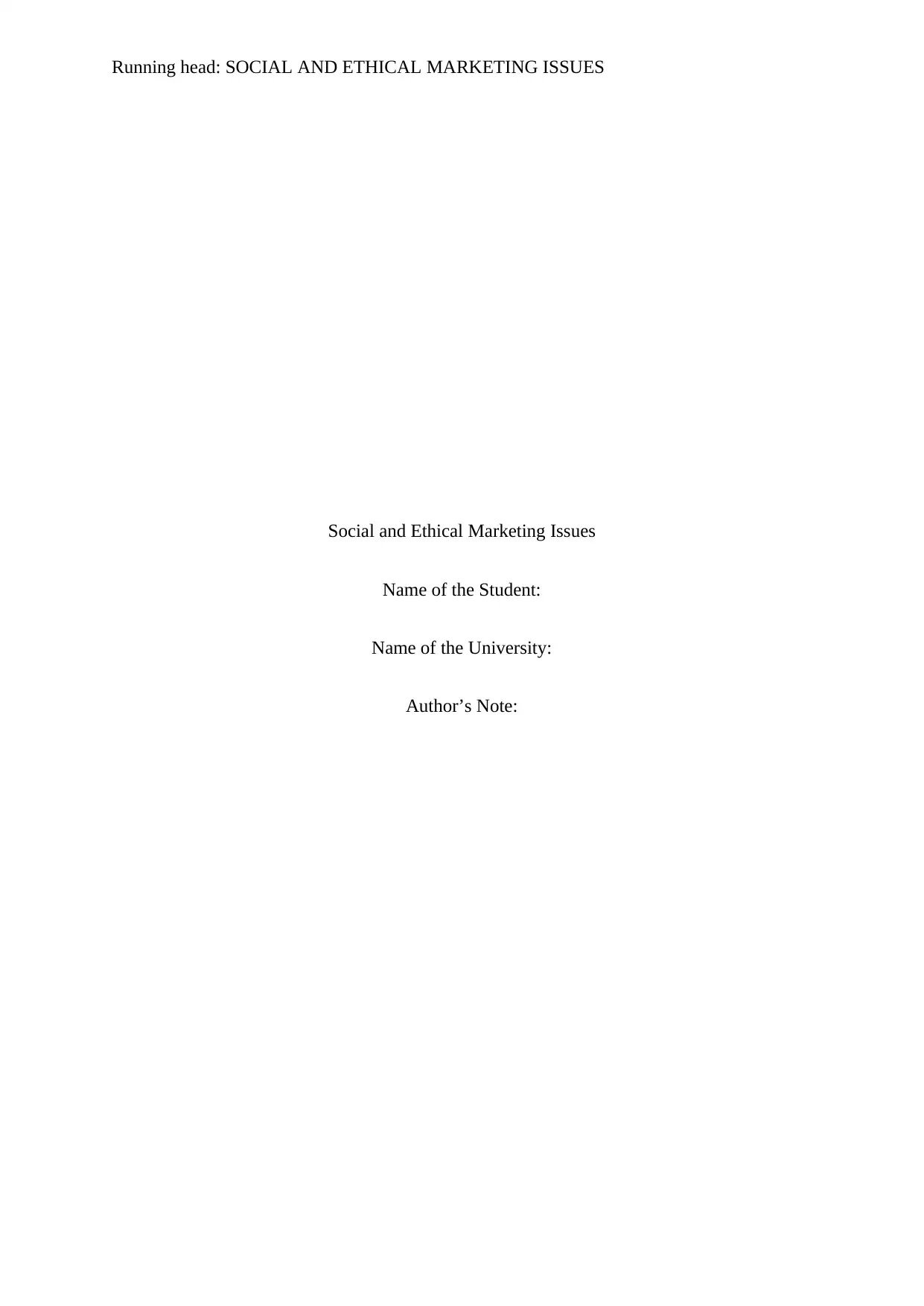
Running head: SOCIAL AND ETHICAL MARKETING ISSUES
Social and Ethical Marketing Issues
Name of the Student:
Name of the University:
Author’s Note:
Social and Ethical Marketing Issues
Name of the Student:
Name of the University:
Author’s Note:
Secure Best Marks with AI Grader
Need help grading? Try our AI Grader for instant feedback on your assignments.
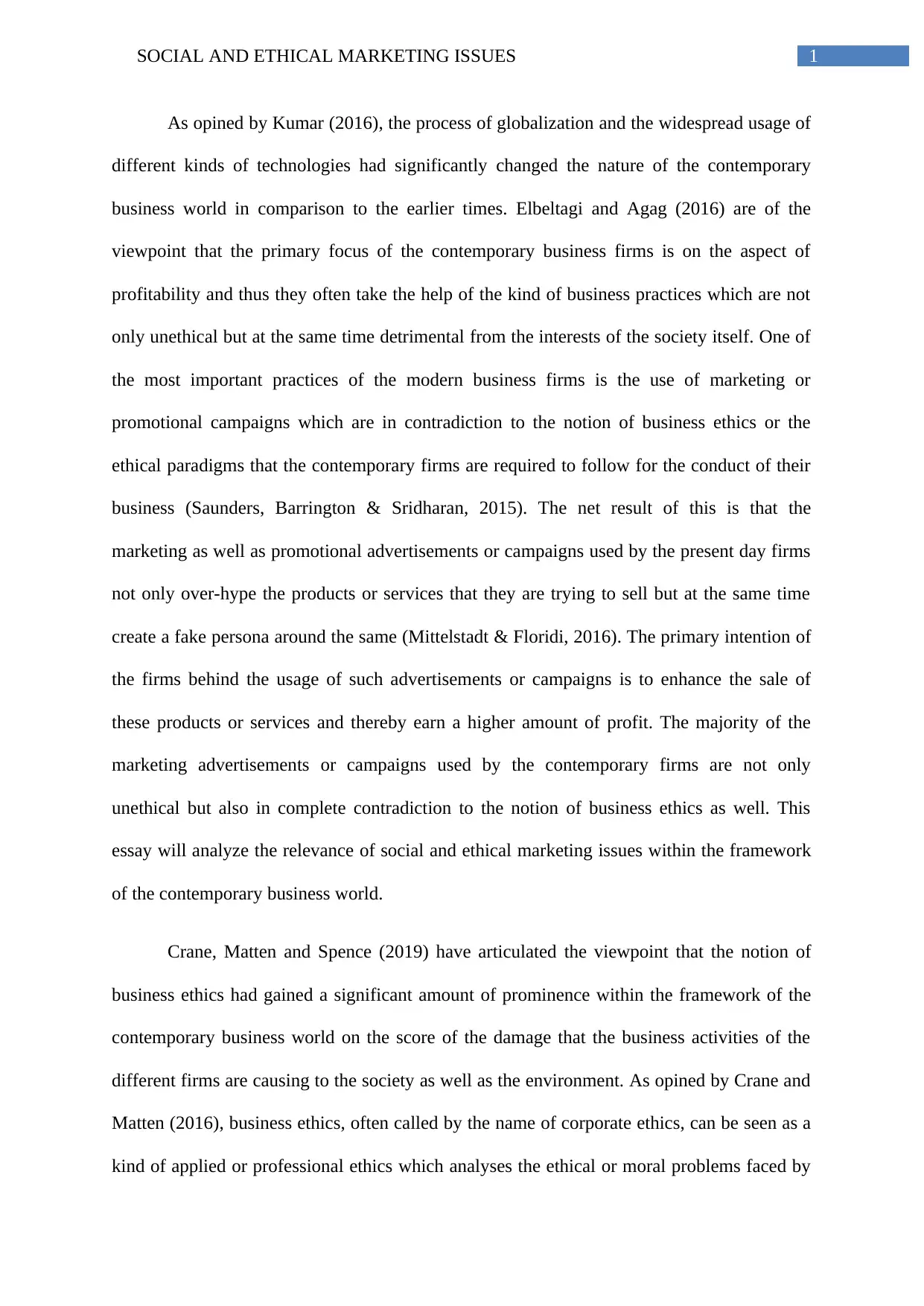
1SOCIAL AND ETHICAL MARKETING ISSUES
As opined by Kumar (2016), the process of globalization and the widespread usage of
different kinds of technologies had significantly changed the nature of the contemporary
business world in comparison to the earlier times. Elbeltagi and Agag (2016) are of the
viewpoint that the primary focus of the contemporary business firms is on the aspect of
profitability and thus they often take the help of the kind of business practices which are not
only unethical but at the same time detrimental from the interests of the society itself. One of
the most important practices of the modern business firms is the use of marketing or
promotional campaigns which are in contradiction to the notion of business ethics or the
ethical paradigms that the contemporary firms are required to follow for the conduct of their
business (Saunders, Barrington & Sridharan, 2015). The net result of this is that the
marketing as well as promotional advertisements or campaigns used by the present day firms
not only over-hype the products or services that they are trying to sell but at the same time
create a fake persona around the same (Mittelstadt & Floridi, 2016). The primary intention of
the firms behind the usage of such advertisements or campaigns is to enhance the sale of
these products or services and thereby earn a higher amount of profit. The majority of the
marketing advertisements or campaigns used by the contemporary firms are not only
unethical but also in complete contradiction to the notion of business ethics as well. This
essay will analyze the relevance of social and ethical marketing issues within the framework
of the contemporary business world.
Crane, Matten and Spence (2019) have articulated the viewpoint that the notion of
business ethics had gained a significant amount of prominence within the framework of the
contemporary business world on the score of the damage that the business activities of the
different firms are causing to the society as well as the environment. As opined by Crane and
Matten (2016), business ethics, often called by the name of corporate ethics, can be seen as a
kind of applied or professional ethics which analyses the ethical or moral problems faced by
As opined by Kumar (2016), the process of globalization and the widespread usage of
different kinds of technologies had significantly changed the nature of the contemporary
business world in comparison to the earlier times. Elbeltagi and Agag (2016) are of the
viewpoint that the primary focus of the contemporary business firms is on the aspect of
profitability and thus they often take the help of the kind of business practices which are not
only unethical but at the same time detrimental from the interests of the society itself. One of
the most important practices of the modern business firms is the use of marketing or
promotional campaigns which are in contradiction to the notion of business ethics or the
ethical paradigms that the contemporary firms are required to follow for the conduct of their
business (Saunders, Barrington & Sridharan, 2015). The net result of this is that the
marketing as well as promotional advertisements or campaigns used by the present day firms
not only over-hype the products or services that they are trying to sell but at the same time
create a fake persona around the same (Mittelstadt & Floridi, 2016). The primary intention of
the firms behind the usage of such advertisements or campaigns is to enhance the sale of
these products or services and thereby earn a higher amount of profit. The majority of the
marketing advertisements or campaigns used by the contemporary firms are not only
unethical but also in complete contradiction to the notion of business ethics as well. This
essay will analyze the relevance of social and ethical marketing issues within the framework
of the contemporary business world.
Crane, Matten and Spence (2019) have articulated the viewpoint that the notion of
business ethics had gained a significant amount of prominence within the framework of the
contemporary business world on the score of the damage that the business activities of the
different firms are causing to the society as well as the environment. As opined by Crane and
Matten (2016), business ethics, often called by the name of corporate ethics, can be seen as a
kind of applied or professional ethics which analyses the ethical or moral problems faced by
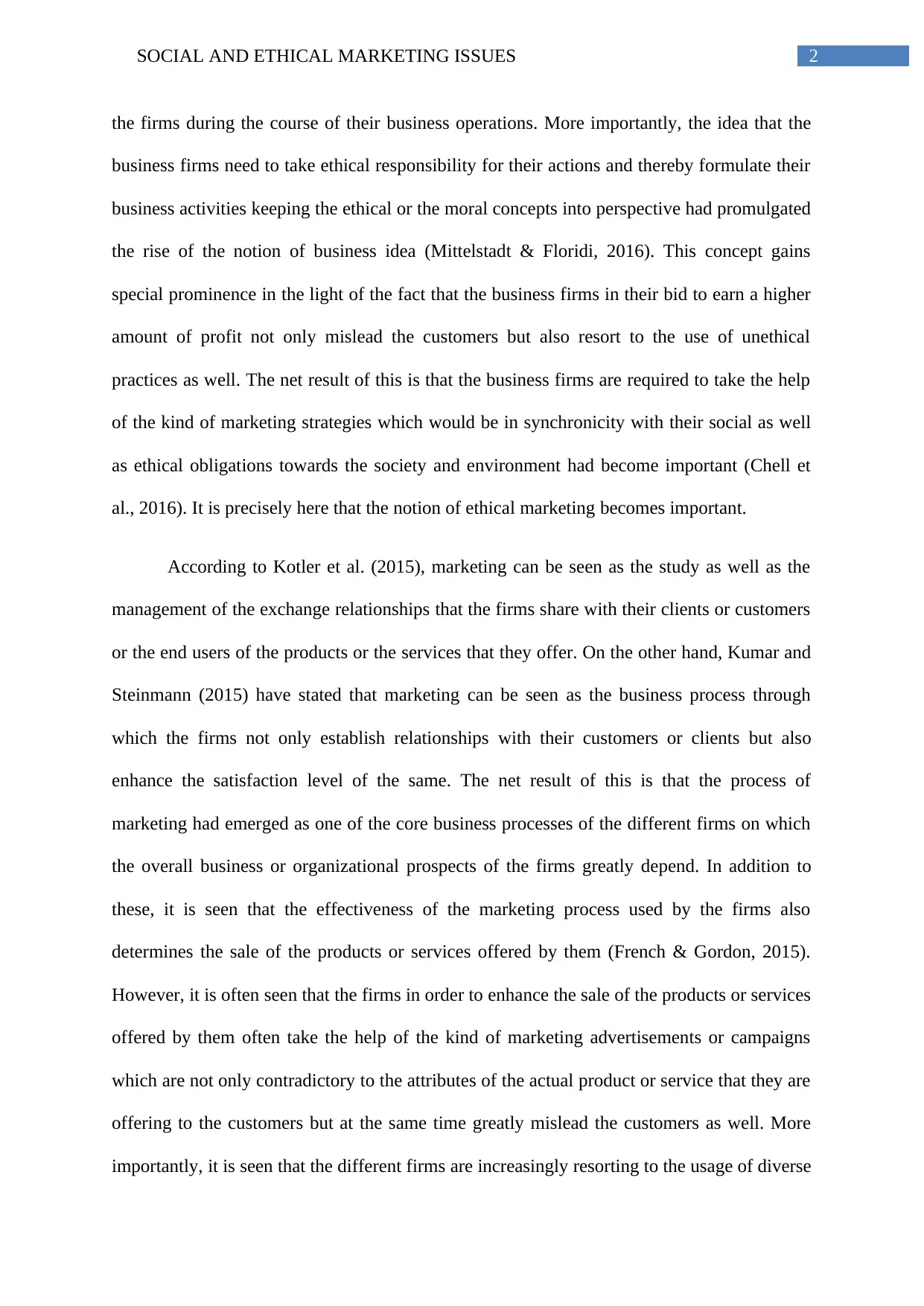
2SOCIAL AND ETHICAL MARKETING ISSUES
the firms during the course of their business operations. More importantly, the idea that the
business firms need to take ethical responsibility for their actions and thereby formulate their
business activities keeping the ethical or the moral concepts into perspective had promulgated
the rise of the notion of business idea (Mittelstadt & Floridi, 2016). This concept gains
special prominence in the light of the fact that the business firms in their bid to earn a higher
amount of profit not only mislead the customers but also resort to the use of unethical
practices as well. The net result of this is that the business firms are required to take the help
of the kind of marketing strategies which would be in synchronicity with their social as well
as ethical obligations towards the society and environment had become important (Chell et
al., 2016). It is precisely here that the notion of ethical marketing becomes important.
According to Kotler et al. (2015), marketing can be seen as the study as well as the
management of the exchange relationships that the firms share with their clients or customers
or the end users of the products or the services that they offer. On the other hand, Kumar and
Steinmann (2015) have stated that marketing can be seen as the business process through
which the firms not only establish relationships with their customers or clients but also
enhance the satisfaction level of the same. The net result of this is that the process of
marketing had emerged as one of the core business processes of the different firms on which
the overall business or organizational prospects of the firms greatly depend. In addition to
these, it is seen that the effectiveness of the marketing process used by the firms also
determines the sale of the products or services offered by them (French & Gordon, 2015).
However, it is often seen that the firms in order to enhance the sale of the products or services
offered by them often take the help of the kind of marketing advertisements or campaigns
which are not only contradictory to the attributes of the actual product or service that they are
offering to the customers but at the same time greatly mislead the customers as well. More
importantly, it is seen that the different firms are increasingly resorting to the usage of diverse
the firms during the course of their business operations. More importantly, the idea that the
business firms need to take ethical responsibility for their actions and thereby formulate their
business activities keeping the ethical or the moral concepts into perspective had promulgated
the rise of the notion of business idea (Mittelstadt & Floridi, 2016). This concept gains
special prominence in the light of the fact that the business firms in their bid to earn a higher
amount of profit not only mislead the customers but also resort to the use of unethical
practices as well. The net result of this is that the business firms are required to take the help
of the kind of marketing strategies which would be in synchronicity with their social as well
as ethical obligations towards the society and environment had become important (Chell et
al., 2016). It is precisely here that the notion of ethical marketing becomes important.
According to Kotler et al. (2015), marketing can be seen as the study as well as the
management of the exchange relationships that the firms share with their clients or customers
or the end users of the products or the services that they offer. On the other hand, Kumar and
Steinmann (2015) have stated that marketing can be seen as the business process through
which the firms not only establish relationships with their customers or clients but also
enhance the satisfaction level of the same. The net result of this is that the process of
marketing had emerged as one of the core business processes of the different firms on which
the overall business or organizational prospects of the firms greatly depend. In addition to
these, it is seen that the effectiveness of the marketing process used by the firms also
determines the sale of the products or services offered by them (French & Gordon, 2015).
However, it is often seen that the firms in order to enhance the sale of the products or services
offered by them often take the help of the kind of marketing advertisements or campaigns
which are not only contradictory to the attributes of the actual product or service that they are
offering to the customers but at the same time greatly mislead the customers as well. More
importantly, it is seen that the different firms are increasingly resorting to the usage of diverse
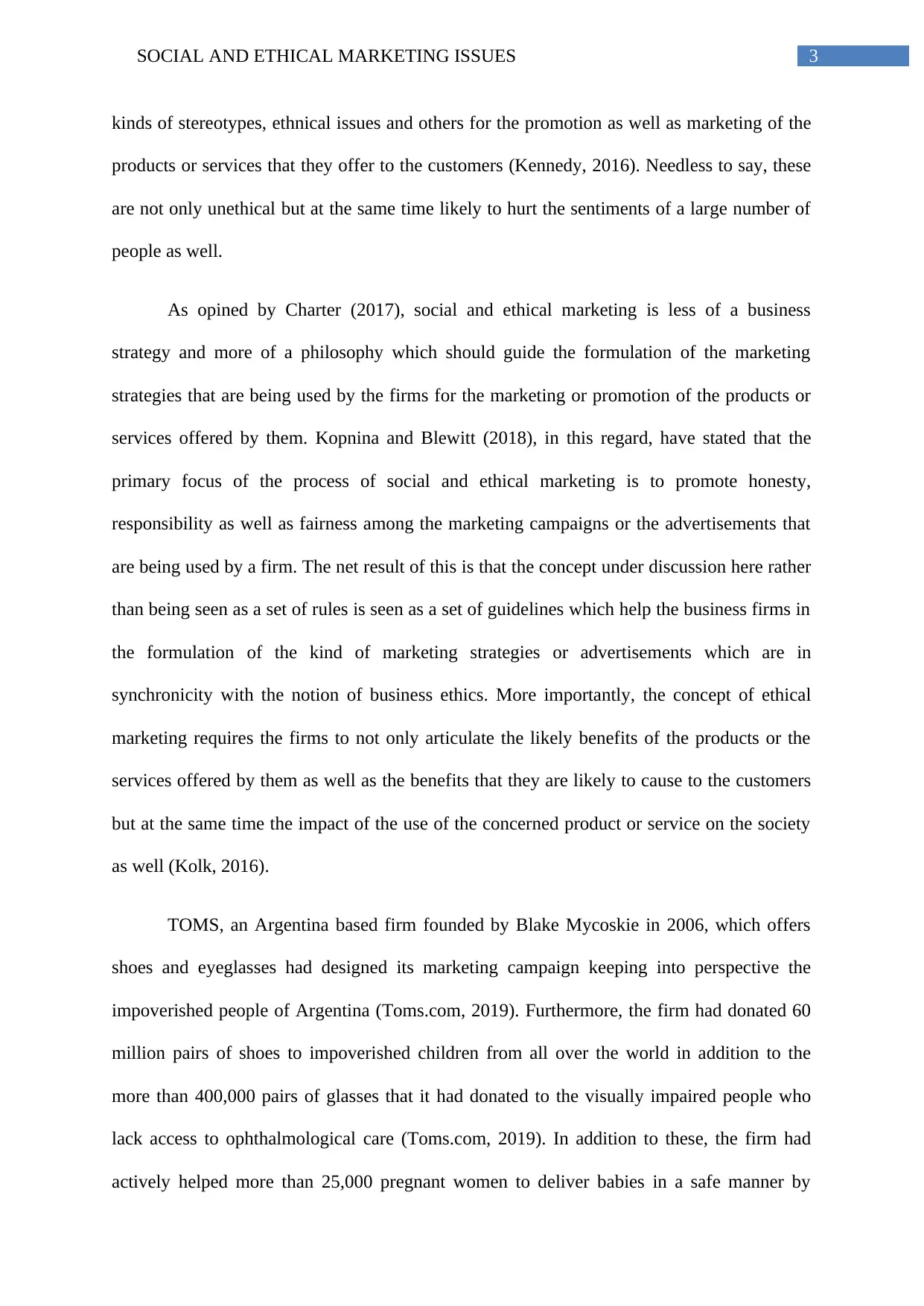
3SOCIAL AND ETHICAL MARKETING ISSUES
kinds of stereotypes, ethnical issues and others for the promotion as well as marketing of the
products or services that they offer to the customers (Kennedy, 2016). Needless to say, these
are not only unethical but at the same time likely to hurt the sentiments of a large number of
people as well.
As opined by Charter (2017), social and ethical marketing is less of a business
strategy and more of a philosophy which should guide the formulation of the marketing
strategies that are being used by the firms for the marketing or promotion of the products or
services offered by them. Kopnina and Blewitt (2018), in this regard, have stated that the
primary focus of the process of social and ethical marketing is to promote honesty,
responsibility as well as fairness among the marketing campaigns or the advertisements that
are being used by a firm. The net result of this is that the concept under discussion here rather
than being seen as a set of rules is seen as a set of guidelines which help the business firms in
the formulation of the kind of marketing strategies or advertisements which are in
synchronicity with the notion of business ethics. More importantly, the concept of ethical
marketing requires the firms to not only articulate the likely benefits of the products or the
services offered by them as well as the benefits that they are likely to cause to the customers
but at the same time the impact of the use of the concerned product or service on the society
as well (Kolk, 2016).
TOMS, an Argentina based firm founded by Blake Mycoskie in 2006, which offers
shoes and eyeglasses had designed its marketing campaign keeping into perspective the
impoverished people of Argentina (Toms.com, 2019). Furthermore, the firm had donated 60
million pairs of shoes to impoverished children from all over the world in addition to the
more than 400,000 pairs of glasses that it had donated to the visually impaired people who
lack access to ophthalmological care (Toms.com, 2019). In addition to these, the firm had
actively helped more than 25,000 pregnant women to deliver babies in a safe manner by
kinds of stereotypes, ethnical issues and others for the promotion as well as marketing of the
products or services that they offer to the customers (Kennedy, 2016). Needless to say, these
are not only unethical but at the same time likely to hurt the sentiments of a large number of
people as well.
As opined by Charter (2017), social and ethical marketing is less of a business
strategy and more of a philosophy which should guide the formulation of the marketing
strategies that are being used by the firms for the marketing or promotion of the products or
services offered by them. Kopnina and Blewitt (2018), in this regard, have stated that the
primary focus of the process of social and ethical marketing is to promote honesty,
responsibility as well as fairness among the marketing campaigns or the advertisements that
are being used by a firm. The net result of this is that the concept under discussion here rather
than being seen as a set of rules is seen as a set of guidelines which help the business firms in
the formulation of the kind of marketing strategies or advertisements which are in
synchronicity with the notion of business ethics. More importantly, the concept of ethical
marketing requires the firms to not only articulate the likely benefits of the products or the
services offered by them as well as the benefits that they are likely to cause to the customers
but at the same time the impact of the use of the concerned product or service on the society
as well (Kolk, 2016).
TOMS, an Argentina based firm founded by Blake Mycoskie in 2006, which offers
shoes and eyeglasses had designed its marketing campaign keeping into perspective the
impoverished people of Argentina (Toms.com, 2019). Furthermore, the firm had donated 60
million pairs of shoes to impoverished children from all over the world in addition to the
more than 400,000 pairs of glasses that it had donated to the visually impaired people who
lack access to ophthalmological care (Toms.com, 2019). In addition to these, the firm had
actively helped more than 25,000 pregnant women to deliver babies in a safe manner by
Secure Best Marks with AI Grader
Need help grading? Try our AI Grader for instant feedback on your assignments.
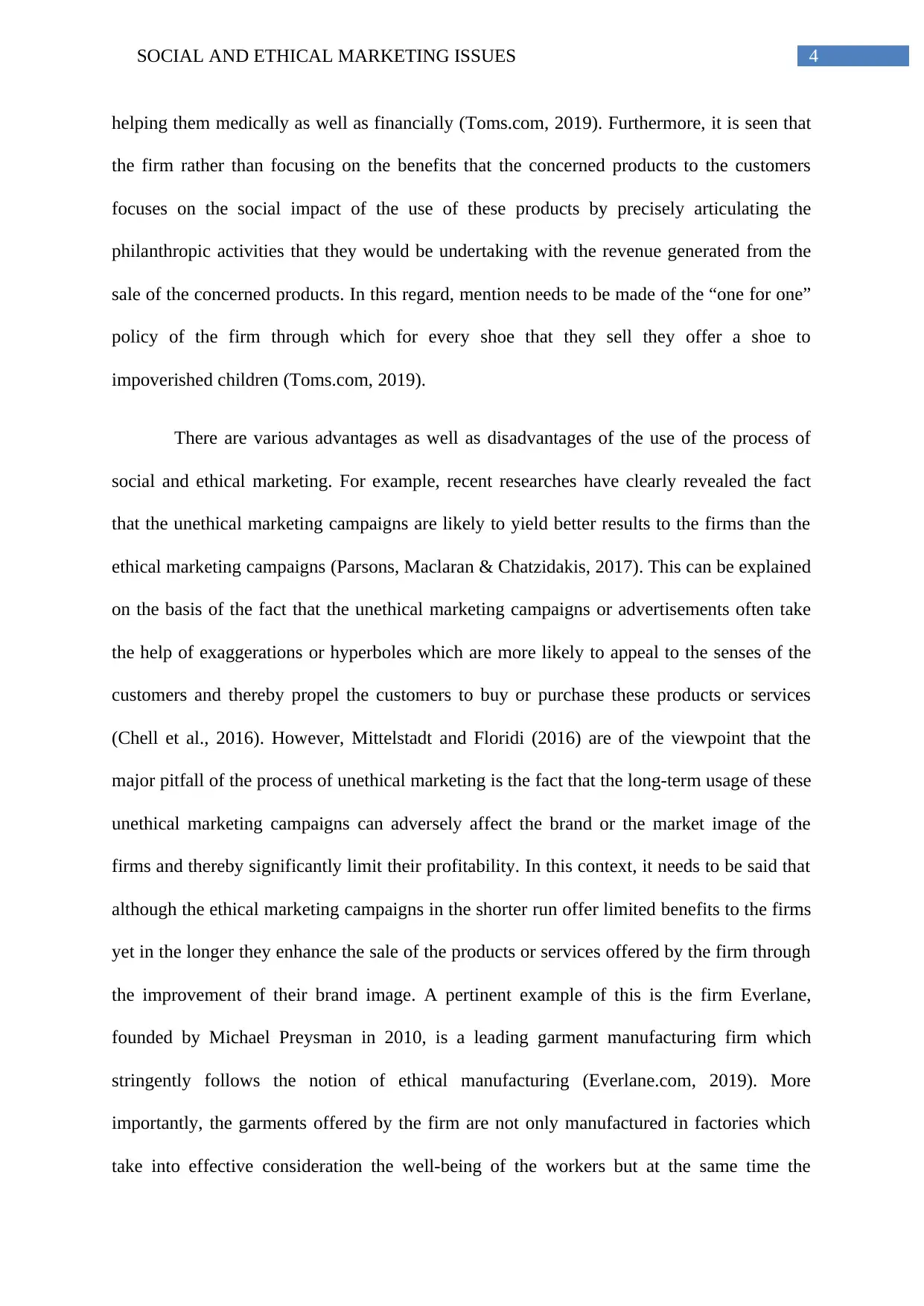
4SOCIAL AND ETHICAL MARKETING ISSUES
helping them medically as well as financially (Toms.com, 2019). Furthermore, it is seen that
the firm rather than focusing on the benefits that the concerned products to the customers
focuses on the social impact of the use of these products by precisely articulating the
philanthropic activities that they would be undertaking with the revenue generated from the
sale of the concerned products. In this regard, mention needs to be made of the “one for one”
policy of the firm through which for every shoe that they sell they offer a shoe to
impoverished children (Toms.com, 2019).
There are various advantages as well as disadvantages of the use of the process of
social and ethical marketing. For example, recent researches have clearly revealed the fact
that the unethical marketing campaigns are likely to yield better results to the firms than the
ethical marketing campaigns (Parsons, Maclaran & Chatzidakis, 2017). This can be explained
on the basis of the fact that the unethical marketing campaigns or advertisements often take
the help of exaggerations or hyperboles which are more likely to appeal to the senses of the
customers and thereby propel the customers to buy or purchase these products or services
(Chell et al., 2016). However, Mittelstadt and Floridi (2016) are of the viewpoint that the
major pitfall of the process of unethical marketing is the fact that the long-term usage of these
unethical marketing campaigns can adversely affect the brand or the market image of the
firms and thereby significantly limit their profitability. In this context, it needs to be said that
although the ethical marketing campaigns in the shorter run offer limited benefits to the firms
yet in the longer they enhance the sale of the products or services offered by the firm through
the improvement of their brand image. A pertinent example of this is the firm Everlane,
founded by Michael Preysman in 2010, is a leading garment manufacturing firm which
stringently follows the notion of ethical manufacturing (Everlane.com, 2019). More
importantly, the garments offered by the firm are not only manufactured in factories which
take into effective consideration the well-being of the workers but at the same time the
helping them medically as well as financially (Toms.com, 2019). Furthermore, it is seen that
the firm rather than focusing on the benefits that the concerned products to the customers
focuses on the social impact of the use of these products by precisely articulating the
philanthropic activities that they would be undertaking with the revenue generated from the
sale of the concerned products. In this regard, mention needs to be made of the “one for one”
policy of the firm through which for every shoe that they sell they offer a shoe to
impoverished children (Toms.com, 2019).
There are various advantages as well as disadvantages of the use of the process of
social and ethical marketing. For example, recent researches have clearly revealed the fact
that the unethical marketing campaigns are likely to yield better results to the firms than the
ethical marketing campaigns (Parsons, Maclaran & Chatzidakis, 2017). This can be explained
on the basis of the fact that the unethical marketing campaigns or advertisements often take
the help of exaggerations or hyperboles which are more likely to appeal to the senses of the
customers and thereby propel the customers to buy or purchase these products or services
(Chell et al., 2016). However, Mittelstadt and Floridi (2016) are of the viewpoint that the
major pitfall of the process of unethical marketing is the fact that the long-term usage of these
unethical marketing campaigns can adversely affect the brand or the market image of the
firms and thereby significantly limit their profitability. In this context, it needs to be said that
although the ethical marketing campaigns in the shorter run offer limited benefits to the firms
yet in the longer they enhance the sale of the products or services offered by the firm through
the improvement of their brand image. A pertinent example of this is the firm Everlane,
founded by Michael Preysman in 2010, is a leading garment manufacturing firm which
stringently follows the notion of ethical manufacturing (Everlane.com, 2019). More
importantly, the garments offered by the firm are not only manufactured in factories which
take into effective consideration the well-being of the workers but at the same time the
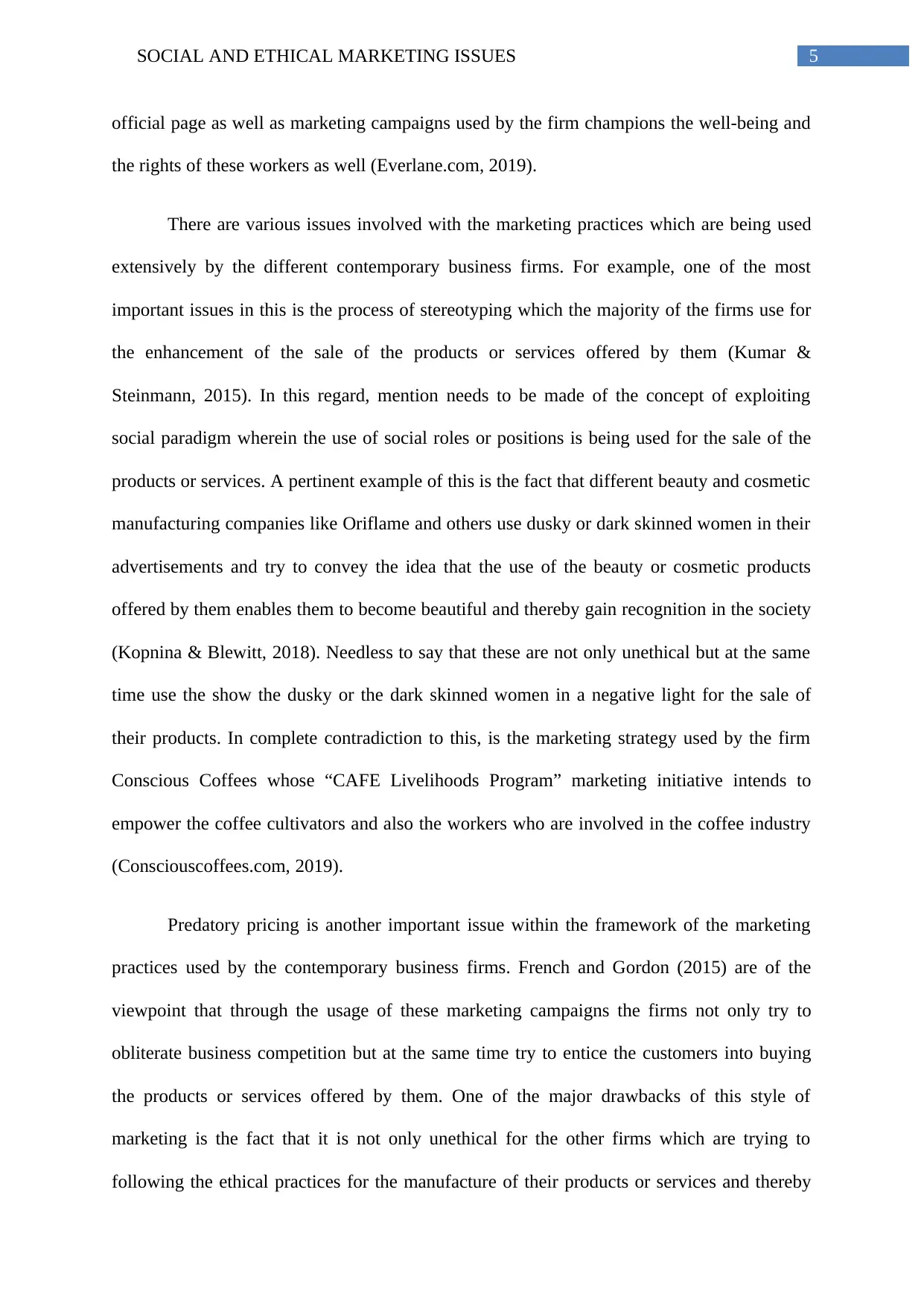
5SOCIAL AND ETHICAL MARKETING ISSUES
official page as well as marketing campaigns used by the firm champions the well-being and
the rights of these workers as well (Everlane.com, 2019).
There are various issues involved with the marketing practices which are being used
extensively by the different contemporary business firms. For example, one of the most
important issues in this is the process of stereotyping which the majority of the firms use for
the enhancement of the sale of the products or services offered by them (Kumar &
Steinmann, 2015). In this regard, mention needs to be made of the concept of exploiting
social paradigm wherein the use of social roles or positions is being used for the sale of the
products or services. A pertinent example of this is the fact that different beauty and cosmetic
manufacturing companies like Oriflame and others use dusky or dark skinned women in their
advertisements and try to convey the idea that the use of the beauty or cosmetic products
offered by them enables them to become beautiful and thereby gain recognition in the society
(Kopnina & Blewitt, 2018). Needless to say that these are not only unethical but at the same
time use the show the dusky or the dark skinned women in a negative light for the sale of
their products. In complete contradiction to this, is the marketing strategy used by the firm
Conscious Coffees whose “CAFE Livelihoods Program” marketing initiative intends to
empower the coffee cultivators and also the workers who are involved in the coffee industry
(Consciouscoffees.com, 2019).
Predatory pricing is another important issue within the framework of the marketing
practices used by the contemporary business firms. French and Gordon (2015) are of the
viewpoint that through the usage of these marketing campaigns the firms not only try to
obliterate business competition but at the same time try to entice the customers into buying
the products or services offered by them. One of the major drawbacks of this style of
marketing is the fact that it is not only unethical for the other firms which are trying to
following the ethical practices for the manufacture of their products or services and thereby
official page as well as marketing campaigns used by the firm champions the well-being and
the rights of these workers as well (Everlane.com, 2019).
There are various issues involved with the marketing practices which are being used
extensively by the different contemporary business firms. For example, one of the most
important issues in this is the process of stereotyping which the majority of the firms use for
the enhancement of the sale of the products or services offered by them (Kumar &
Steinmann, 2015). In this regard, mention needs to be made of the concept of exploiting
social paradigm wherein the use of social roles or positions is being used for the sale of the
products or services. A pertinent example of this is the fact that different beauty and cosmetic
manufacturing companies like Oriflame and others use dusky or dark skinned women in their
advertisements and try to convey the idea that the use of the beauty or cosmetic products
offered by them enables them to become beautiful and thereby gain recognition in the society
(Kopnina & Blewitt, 2018). Needless to say that these are not only unethical but at the same
time use the show the dusky or the dark skinned women in a negative light for the sale of
their products. In complete contradiction to this, is the marketing strategy used by the firm
Conscious Coffees whose “CAFE Livelihoods Program” marketing initiative intends to
empower the coffee cultivators and also the workers who are involved in the coffee industry
(Consciouscoffees.com, 2019).
Predatory pricing is another important issue within the framework of the marketing
practices used by the contemporary business firms. French and Gordon (2015) are of the
viewpoint that through the usage of these marketing campaigns the firms not only try to
obliterate business competition but at the same time try to entice the customers into buying
the products or services offered by them. One of the major drawbacks of this style of
marketing is the fact that it is not only unethical for the other firms which are trying to
following the ethical practices for the manufacture of their products or services and thereby
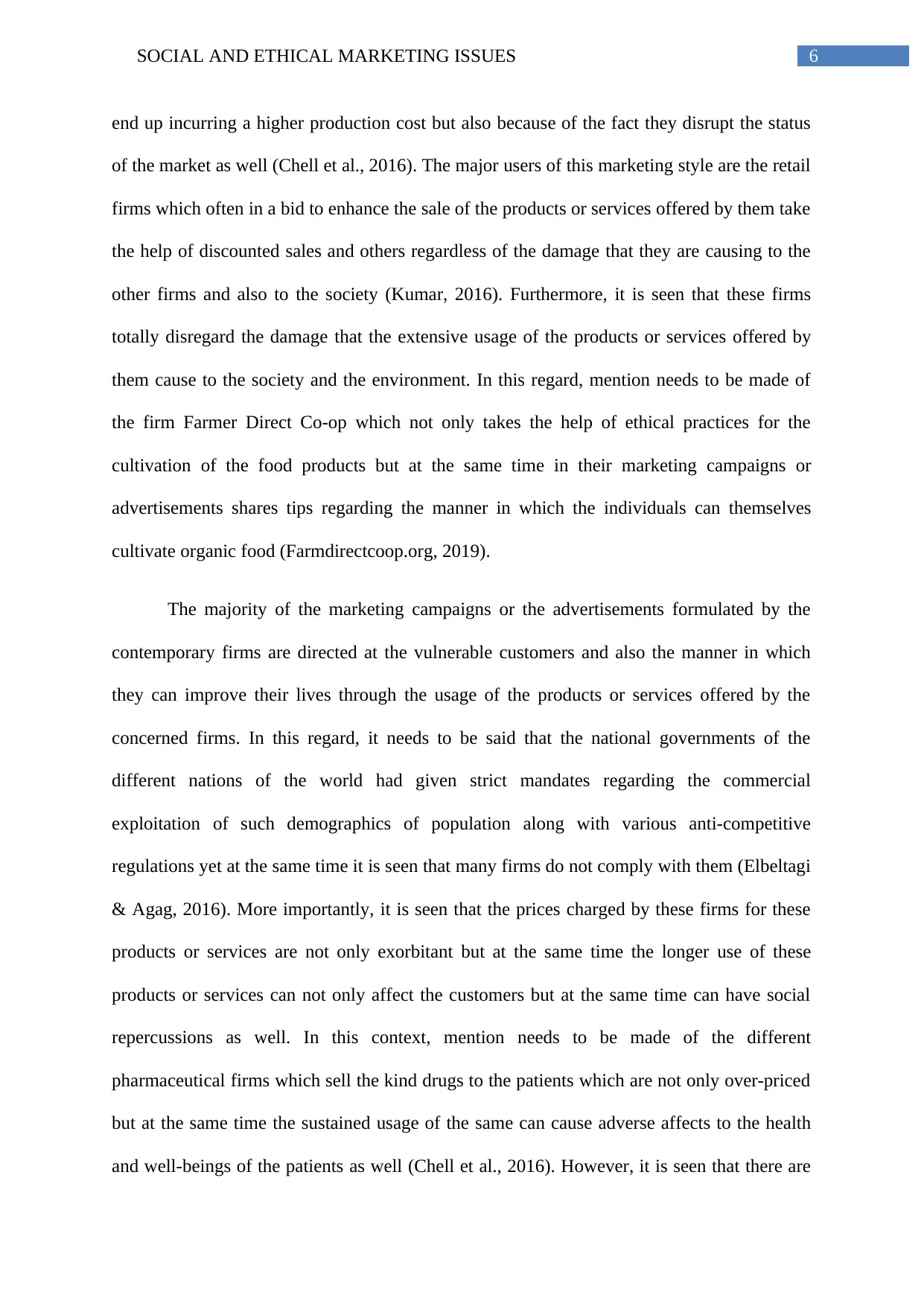
6SOCIAL AND ETHICAL MARKETING ISSUES
end up incurring a higher production cost but also because of the fact they disrupt the status
of the market as well (Chell et al., 2016). The major users of this marketing style are the retail
firms which often in a bid to enhance the sale of the products or services offered by them take
the help of discounted sales and others regardless of the damage that they are causing to the
other firms and also to the society (Kumar, 2016). Furthermore, it is seen that these firms
totally disregard the damage that the extensive usage of the products or services offered by
them cause to the society and the environment. In this regard, mention needs to be made of
the firm Farmer Direct Co-op which not only takes the help of ethical practices for the
cultivation of the food products but at the same time in their marketing campaigns or
advertisements shares tips regarding the manner in which the individuals can themselves
cultivate organic food (Farmdirectcoop.org, 2019).
The majority of the marketing campaigns or the advertisements formulated by the
contemporary firms are directed at the vulnerable customers and also the manner in which
they can improve their lives through the usage of the products or services offered by the
concerned firms. In this regard, it needs to be said that the national governments of the
different nations of the world had given strict mandates regarding the commercial
exploitation of such demographics of population along with various anti-competitive
regulations yet at the same time it is seen that many firms do not comply with them (Elbeltagi
& Agag, 2016). More importantly, it is seen that the prices charged by these firms for these
products or services are not only exorbitant but at the same time the longer use of these
products or services can not only affect the customers but at the same time can have social
repercussions as well. In this context, mention needs to be made of the different
pharmaceutical firms which sell the kind drugs to the patients which are not only over-priced
but at the same time the sustained usage of the same can cause adverse affects to the health
and well-beings of the patients as well (Chell et al., 2016). However, it is seen that there are
end up incurring a higher production cost but also because of the fact they disrupt the status
of the market as well (Chell et al., 2016). The major users of this marketing style are the retail
firms which often in a bid to enhance the sale of the products or services offered by them take
the help of discounted sales and others regardless of the damage that they are causing to the
other firms and also to the society (Kumar, 2016). Furthermore, it is seen that these firms
totally disregard the damage that the extensive usage of the products or services offered by
them cause to the society and the environment. In this regard, mention needs to be made of
the firm Farmer Direct Co-op which not only takes the help of ethical practices for the
cultivation of the food products but at the same time in their marketing campaigns or
advertisements shares tips regarding the manner in which the individuals can themselves
cultivate organic food (Farmdirectcoop.org, 2019).
The majority of the marketing campaigns or the advertisements formulated by the
contemporary firms are directed at the vulnerable customers and also the manner in which
they can improve their lives through the usage of the products or services offered by the
concerned firms. In this regard, it needs to be said that the national governments of the
different nations of the world had given strict mandates regarding the commercial
exploitation of such demographics of population along with various anti-competitive
regulations yet at the same time it is seen that many firms do not comply with them (Elbeltagi
& Agag, 2016). More importantly, it is seen that the prices charged by these firms for these
products or services are not only exorbitant but at the same time the longer use of these
products or services can not only affect the customers but at the same time can have social
repercussions as well. In this context, mention needs to be made of the different
pharmaceutical firms which sell the kind drugs to the patients which are not only over-priced
but at the same time the sustained usage of the same can cause adverse affects to the health
and well-beings of the patients as well (Chell et al., 2016). However, it is seen that there are
Paraphrase This Document
Need a fresh take? Get an instant paraphrase of this document with our AI Paraphraser
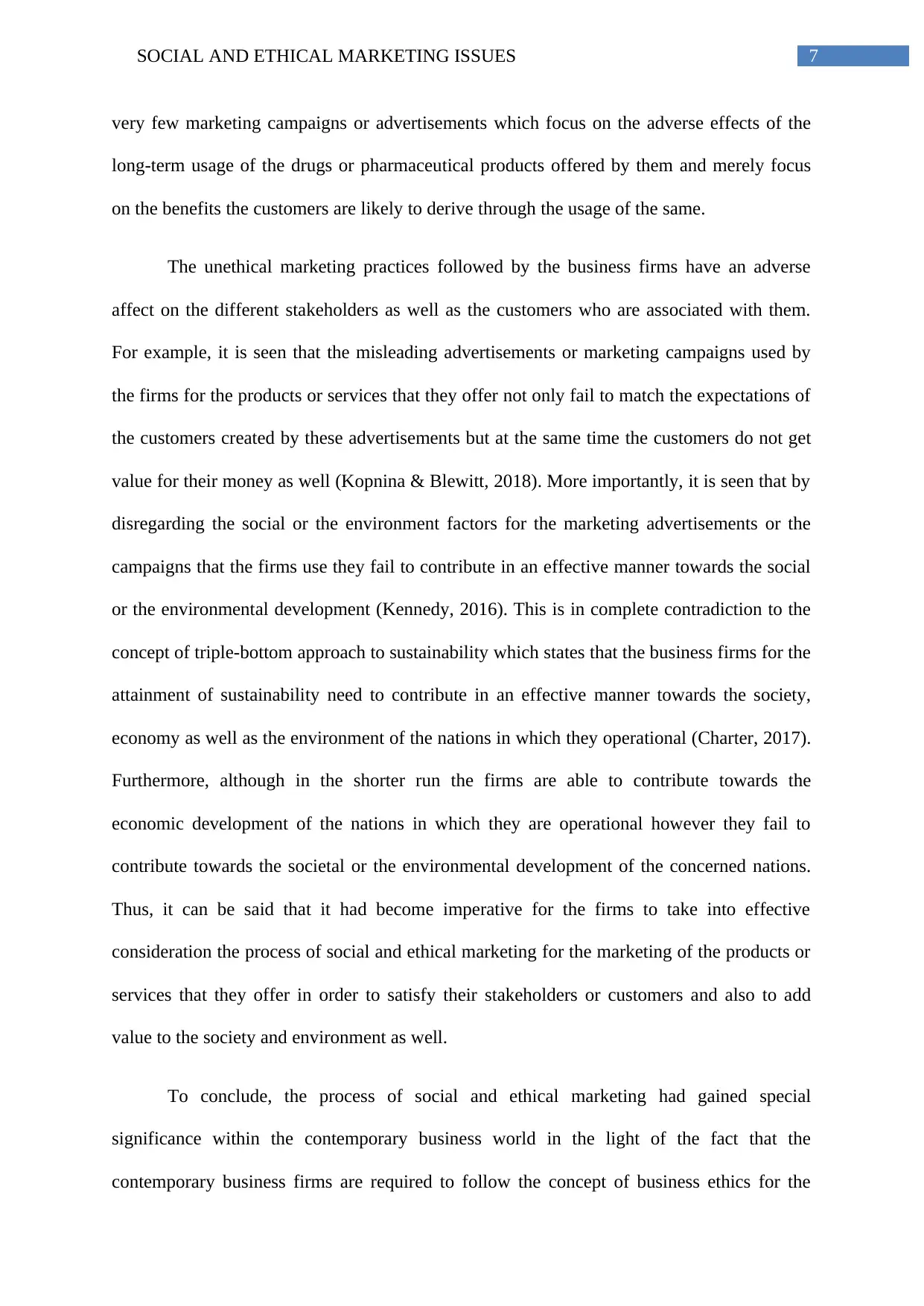
7SOCIAL AND ETHICAL MARKETING ISSUES
very few marketing campaigns or advertisements which focus on the adverse effects of the
long-term usage of the drugs or pharmaceutical products offered by them and merely focus
on the benefits the customers are likely to derive through the usage of the same.
The unethical marketing practices followed by the business firms have an adverse
affect on the different stakeholders as well as the customers who are associated with them.
For example, it is seen that the misleading advertisements or marketing campaigns used by
the firms for the products or services that they offer not only fail to match the expectations of
the customers created by these advertisements but at the same time the customers do not get
value for their money as well (Kopnina & Blewitt, 2018). More importantly, it is seen that by
disregarding the social or the environment factors for the marketing advertisements or the
campaigns that the firms use they fail to contribute in an effective manner towards the social
or the environmental development (Kennedy, 2016). This is in complete contradiction to the
concept of triple-bottom approach to sustainability which states that the business firms for the
attainment of sustainability need to contribute in an effective manner towards the society,
economy as well as the environment of the nations in which they operational (Charter, 2017).
Furthermore, although in the shorter run the firms are able to contribute towards the
economic development of the nations in which they are operational however they fail to
contribute towards the societal or the environmental development of the concerned nations.
Thus, it can be said that it had become imperative for the firms to take into effective
consideration the process of social and ethical marketing for the marketing of the products or
services that they offer in order to satisfy their stakeholders or customers and also to add
value to the society and environment as well.
To conclude, the process of social and ethical marketing had gained special
significance within the contemporary business world in the light of the fact that the
contemporary business firms are required to follow the concept of business ethics for the
very few marketing campaigns or advertisements which focus on the adverse effects of the
long-term usage of the drugs or pharmaceutical products offered by them and merely focus
on the benefits the customers are likely to derive through the usage of the same.
The unethical marketing practices followed by the business firms have an adverse
affect on the different stakeholders as well as the customers who are associated with them.
For example, it is seen that the misleading advertisements or marketing campaigns used by
the firms for the products or services that they offer not only fail to match the expectations of
the customers created by these advertisements but at the same time the customers do not get
value for their money as well (Kopnina & Blewitt, 2018). More importantly, it is seen that by
disregarding the social or the environment factors for the marketing advertisements or the
campaigns that the firms use they fail to contribute in an effective manner towards the social
or the environmental development (Kennedy, 2016). This is in complete contradiction to the
concept of triple-bottom approach to sustainability which states that the business firms for the
attainment of sustainability need to contribute in an effective manner towards the society,
economy as well as the environment of the nations in which they operational (Charter, 2017).
Furthermore, although in the shorter run the firms are able to contribute towards the
economic development of the nations in which they are operational however they fail to
contribute towards the societal or the environmental development of the concerned nations.
Thus, it can be said that it had become imperative for the firms to take into effective
consideration the process of social and ethical marketing for the marketing of the products or
services that they offer in order to satisfy their stakeholders or customers and also to add
value to the society and environment as well.
To conclude, the process of social and ethical marketing had gained special
significance within the contemporary business world in the light of the fact that the
contemporary business firms are required to follow the concept of business ethics for the
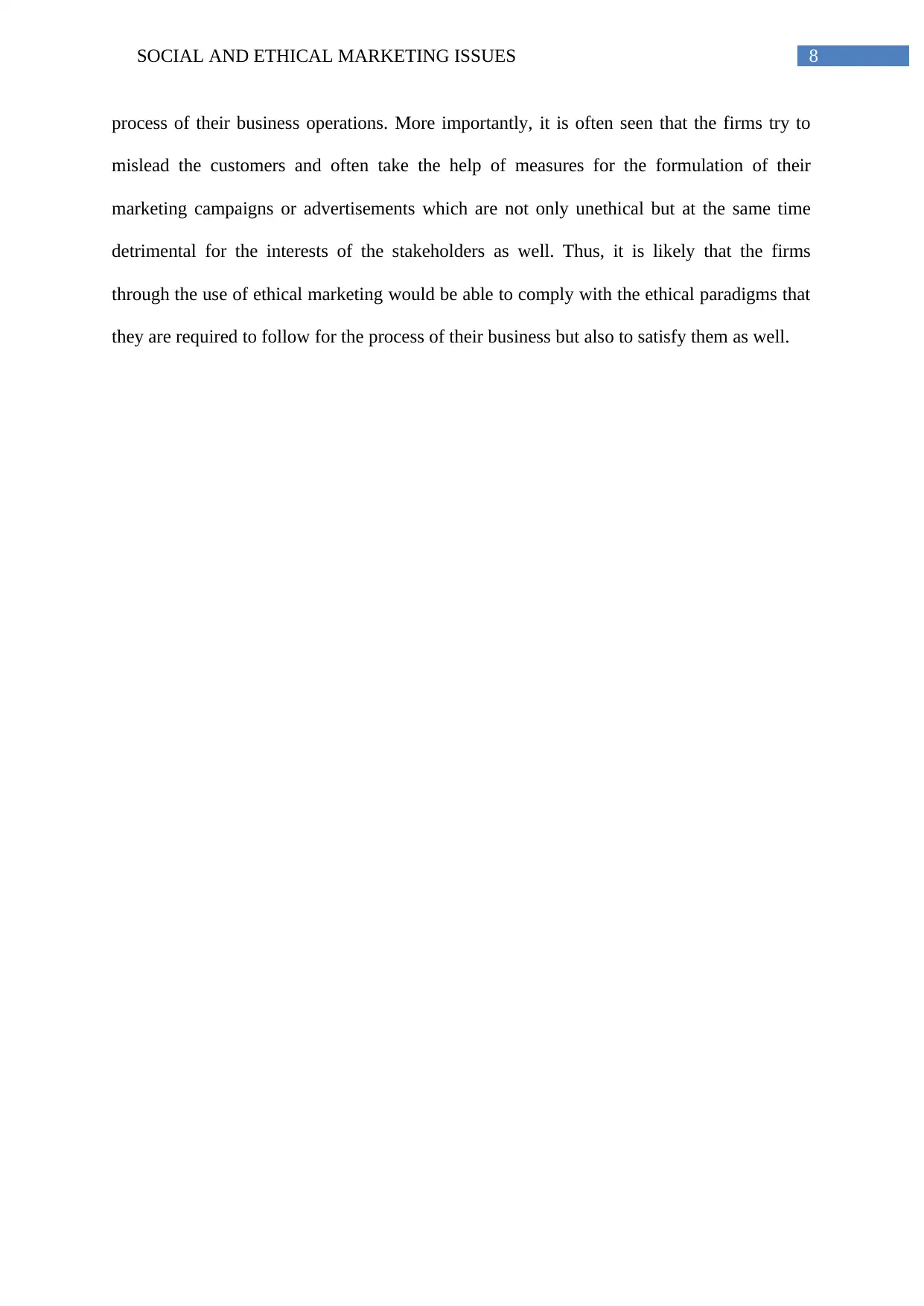
8SOCIAL AND ETHICAL MARKETING ISSUES
process of their business operations. More importantly, it is often seen that the firms try to
mislead the customers and often take the help of measures for the formulation of their
marketing campaigns or advertisements which are not only unethical but at the same time
detrimental for the interests of the stakeholders as well. Thus, it is likely that the firms
through the use of ethical marketing would be able to comply with the ethical paradigms that
they are required to follow for the process of their business but also to satisfy them as well.
process of their business operations. More importantly, it is often seen that the firms try to
mislead the customers and often take the help of measures for the formulation of their
marketing campaigns or advertisements which are not only unethical but at the same time
detrimental for the interests of the stakeholders as well. Thus, it is likely that the firms
through the use of ethical marketing would be able to comply with the ethical paradigms that
they are required to follow for the process of their business but also to satisfy them as well.
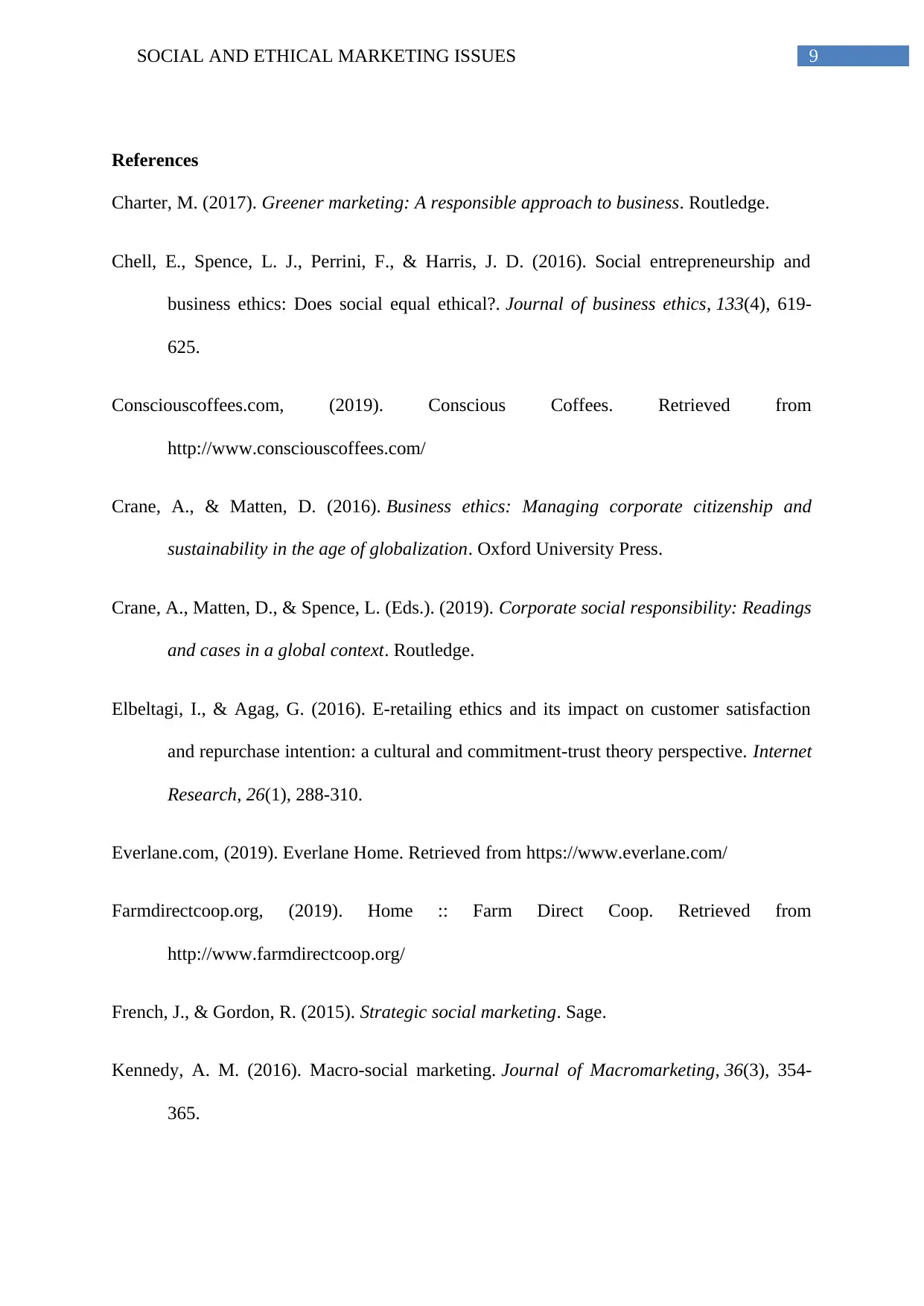
9SOCIAL AND ETHICAL MARKETING ISSUES
References
Charter, M. (2017). Greener marketing: A responsible approach to business. Routledge.
Chell, E., Spence, L. J., Perrini, F., & Harris, J. D. (2016). Social entrepreneurship and
business ethics: Does social equal ethical?. Journal of business ethics, 133(4), 619-
625.
Consciouscoffees.com, (2019). Conscious Coffees. Retrieved from
http://www.consciouscoffees.com/
Crane, A., & Matten, D. (2016). Business ethics: Managing corporate citizenship and
sustainability in the age of globalization. Oxford University Press.
Crane, A., Matten, D., & Spence, L. (Eds.). (2019). Corporate social responsibility: Readings
and cases in a global context. Routledge.
Elbeltagi, I., & Agag, G. (2016). E-retailing ethics and its impact on customer satisfaction
and repurchase intention: a cultural and commitment-trust theory perspective. Internet
Research, 26(1), 288-310.
Everlane.com, (2019). Everlane Home. Retrieved from https://www.everlane.com/
Farmdirectcoop.org, (2019). Home :: Farm Direct Coop. Retrieved from
http://www.farmdirectcoop.org/
French, J., & Gordon, R. (2015). Strategic social marketing. Sage.
Kennedy, A. M. (2016). Macro-social marketing. Journal of Macromarketing, 36(3), 354-
365.
References
Charter, M. (2017). Greener marketing: A responsible approach to business. Routledge.
Chell, E., Spence, L. J., Perrini, F., & Harris, J. D. (2016). Social entrepreneurship and
business ethics: Does social equal ethical?. Journal of business ethics, 133(4), 619-
625.
Consciouscoffees.com, (2019). Conscious Coffees. Retrieved from
http://www.consciouscoffees.com/
Crane, A., & Matten, D. (2016). Business ethics: Managing corporate citizenship and
sustainability in the age of globalization. Oxford University Press.
Crane, A., Matten, D., & Spence, L. (Eds.). (2019). Corporate social responsibility: Readings
and cases in a global context. Routledge.
Elbeltagi, I., & Agag, G. (2016). E-retailing ethics and its impact on customer satisfaction
and repurchase intention: a cultural and commitment-trust theory perspective. Internet
Research, 26(1), 288-310.
Everlane.com, (2019). Everlane Home. Retrieved from https://www.everlane.com/
Farmdirectcoop.org, (2019). Home :: Farm Direct Coop. Retrieved from
http://www.farmdirectcoop.org/
French, J., & Gordon, R. (2015). Strategic social marketing. Sage.
Kennedy, A. M. (2016). Macro-social marketing. Journal of Macromarketing, 36(3), 354-
365.
Secure Best Marks with AI Grader
Need help grading? Try our AI Grader for instant feedback on your assignments.
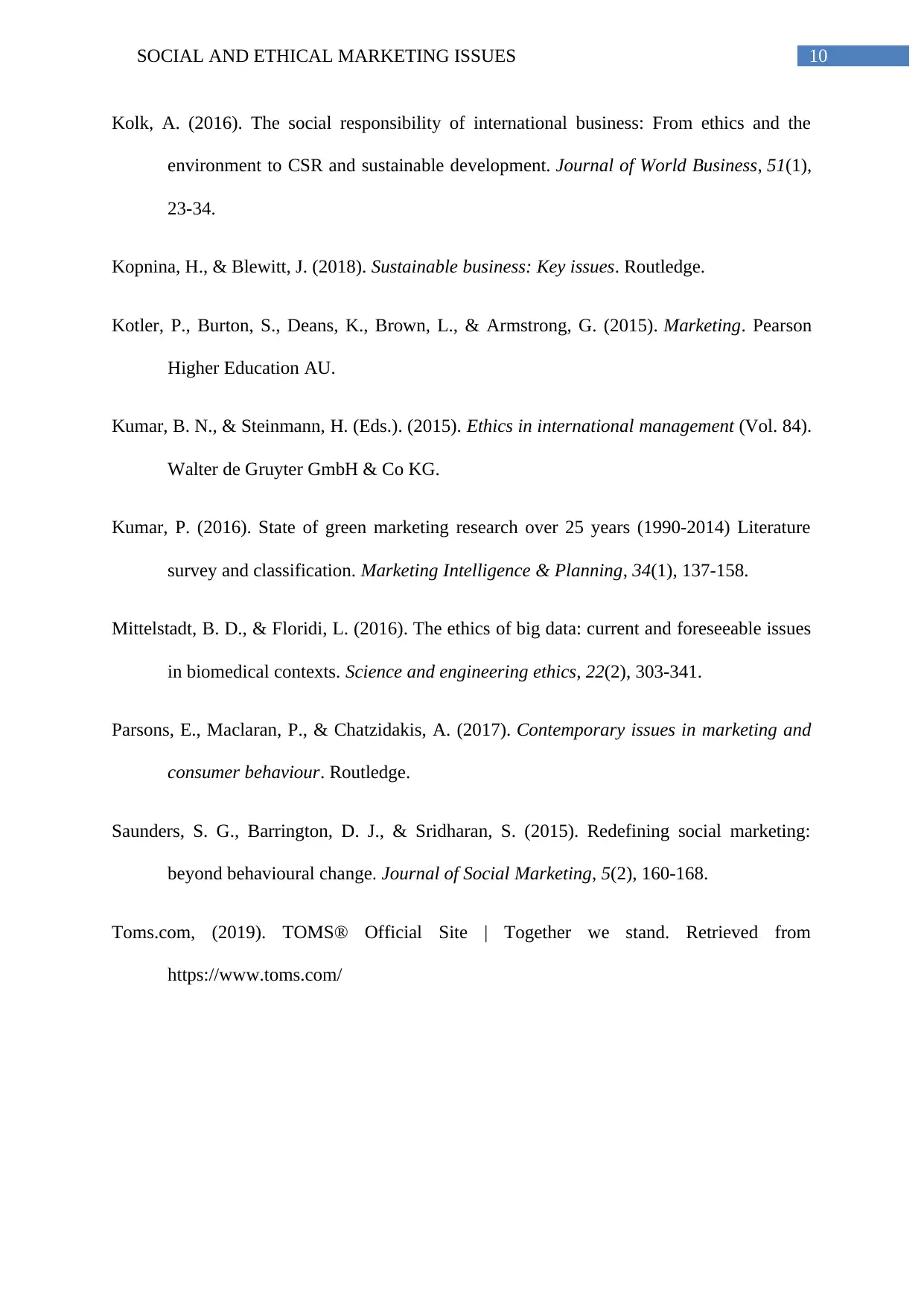
10SOCIAL AND ETHICAL MARKETING ISSUES
Kolk, A. (2016). The social responsibility of international business: From ethics and the
environment to CSR and sustainable development. Journal of World Business, 51(1),
23-34.
Kopnina, H., & Blewitt, J. (2018). Sustainable business: Key issues. Routledge.
Kotler, P., Burton, S., Deans, K., Brown, L., & Armstrong, G. (2015). Marketing. Pearson
Higher Education AU.
Kumar, B. N., & Steinmann, H. (Eds.). (2015). Ethics in international management (Vol. 84).
Walter de Gruyter GmbH & Co KG.
Kumar, P. (2016). State of green marketing research over 25 years (1990-2014) Literature
survey and classification. Marketing Intelligence & Planning, 34(1), 137-158.
Mittelstadt, B. D., & Floridi, L. (2016). The ethics of big data: current and foreseeable issues
in biomedical contexts. Science and engineering ethics, 22(2), 303-341.
Parsons, E., Maclaran, P., & Chatzidakis, A. (2017). Contemporary issues in marketing and
consumer behaviour. Routledge.
Saunders, S. G., Barrington, D. J., & Sridharan, S. (2015). Redefining social marketing:
beyond behavioural change. Journal of Social Marketing, 5(2), 160-168.
Toms.com, (2019). TOMS® Official Site | Together we stand. Retrieved from
https://www.toms.com/
Kolk, A. (2016). The social responsibility of international business: From ethics and the
environment to CSR and sustainable development. Journal of World Business, 51(1),
23-34.
Kopnina, H., & Blewitt, J. (2018). Sustainable business: Key issues. Routledge.
Kotler, P., Burton, S., Deans, K., Brown, L., & Armstrong, G. (2015). Marketing. Pearson
Higher Education AU.
Kumar, B. N., & Steinmann, H. (Eds.). (2015). Ethics in international management (Vol. 84).
Walter de Gruyter GmbH & Co KG.
Kumar, P. (2016). State of green marketing research over 25 years (1990-2014) Literature
survey and classification. Marketing Intelligence & Planning, 34(1), 137-158.
Mittelstadt, B. D., & Floridi, L. (2016). The ethics of big data: current and foreseeable issues
in biomedical contexts. Science and engineering ethics, 22(2), 303-341.
Parsons, E., Maclaran, P., & Chatzidakis, A. (2017). Contemporary issues in marketing and
consumer behaviour. Routledge.
Saunders, S. G., Barrington, D. J., & Sridharan, S. (2015). Redefining social marketing:
beyond behavioural change. Journal of Social Marketing, 5(2), 160-168.
Toms.com, (2019). TOMS® Official Site | Together we stand. Retrieved from
https://www.toms.com/
1 out of 11
Related Documents
Your All-in-One AI-Powered Toolkit for Academic Success.
+13062052269
info@desklib.com
Available 24*7 on WhatsApp / Email
![[object Object]](/_next/static/media/star-bottom.7253800d.svg)
Unlock your academic potential
© 2024 | Zucol Services PVT LTD | All rights reserved.




